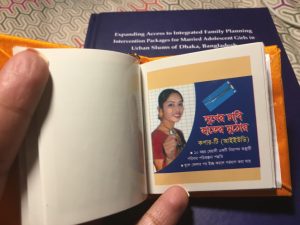By: Farzana Karim| Master of Public Health (Maternal & Child Health) | Anticipated Graduation: May 2017
Background: International Centre for Diarrhoeal Disease Research, Bangladesh (icddr,b) is a research institution “committed to solving public health problems facing low- and middle-income countries through innovative scientific research – including laboratory-based, clinical, epidemiological and health systems research.”
I am a bit ashamed to admit that just a few months ago, I questioned who would want to talk about sex, family planning, or unintended pregnancy in a conservative country like Bangladesh. I was anxious and eager to learn about the research and work that can be conducted on a topic that is considered culturally “inappropriate” to openly talk about: sexual behavior and reproductive health. I generalized that everyone (including professionals) felt uncomfortable talking about something so personal – to some extent, this is still true. However, for the most part, I’m so glad I was wrong.
I joined a dedicated and diverse group of researchers in the Maternal and Child Health Department (MCHD) at icddr,b on their adolescent study in mid-May. Baseline data for the prevalence of unintended pregnancy among married adolescent girls living in (5) urban slums of Dhaka, Bangladesh was collected in 2013. After the research report with STEPUP was published in 2014, researchers created a multifaceted approach with an aim to reduce unintended pregnancy rate in this vulnerable population –a population on which there is limited-to-no research on.
The main component of the study was the “Married Adolescent Girls Club” for girls 14-19 years, which involved community leaders and female health workers, to teach and discuss the impact of early childbearing, family planning methods, unintended pregnancy, and where to access contraceptive methods (pills, LARCs, etc). After one year of intervention, the club sessions ended in March and end-line data collection started soon after. Another component of the study involved Marriage Registrars (influential leaders) to give newlyweds a pocket-book key chain containing family planning information. I visited both intervention areas with Research Investigators to assess the work of field research assistants and the quality of end-line interviews of club attendees. I was impressed with how much knowledge the respondents had about family planning methods and the changes in their attitudes (compared to baseline data).
I met one 17-year old girl in my first field visit to Beguntila, Mirpur who had a one and half year old son and an induced abortion. [Since abortion in Bangladesh is illegal, “menstrual regulation with medication” (MRM –also known as “the combination pack: mifepristone –misoprostol”) is an available option.] Unfortunately, she experienced an incomplete abortion with adverse side-affects of which she was unaware, and had to go to a clinic for a manual vacuum aspiration (MVA). Primary accounts like this depict the need for better oversight of the availability and provision of mifepristone-misoprostol combination for induction of MR among private pharmacies and pharmacy workers in Bangladesh. This is another area of research that icddr,b’s MCHD has also worked on and in which I am excited to be involved.
**[Shout out to my MCHD folks for countless repro-health jokes, conversations about sociology and family planning in the context of our culture, public health terms in my mother-tongue, and endless love.]**
PS A special thank you to the George Washington University Knowledge in Action and Career Internship Fund (KACIF) for awarding me a grant that allowed me to participate in this initiative.


